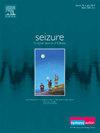The spectrum of cognitive outcomes following admission to hospital for refractory status epilepticus (RSE): A scoping review
IF 2.8
3区 医学
Q2 CLINICAL NEUROLOGY
引用次数: 0
Abstract
Background
Refractory status epilepticus (RSE) may have many different causes. Preventing neurological complications and controlling acute seizures are early priorities, but long-term cognitive consequences must also be considered.
Objective
The objective of this scoping review is to report the spectrum of outcomes following admission to hospital for RSE from all etiologies and to determine whether there is evidence to suggest that survivors of new-onset RSE (NORSE) have different cognitive outcomes compared to survivors of RSE of identified etiology.
Methods
Scoping review methodology was used for this study. A clinical librarian prepared the search strategy. Studies were eligible if they were original research reporting cognitive outcomes after RSE.
Results
2202 articles were identified, of which 2121 were excluded. After full text review, we included 14 studies. Studies were from 2005–2023 and included retrospective, prospective and case studies with a total of 323 patients from ages 1–80 years. Outcomes were similar across studies, but there was heterogeneity with respect to tests used and timing of outcome measurement. Most pediatric reports were in survivors of NORSE and a minority of pediatric survivors return to baseline, with a large proportion of survivors having intellectual disability ranging from mild to severe. Outcomes were less consistent across adult survivors, with some having minimal cognitive impairment and others reporting that no previously employed patients returning to employment.
Conclusion
Current approaches to cognitive assessment in survivors of RSE are highly variable. A large proportion of survivors had impairment in greater than one cognitive domain. Future research should focus on using age-appropriate, domain-specific tools administered at defined timepoints post-RSE.
难治性癫痫持续状态(RSE)入院后的认知结果谱:一项范围综述。
背景:难治性癫痫持续状态(RSE)可能有许多不同的原因。预防神经系统并发症和控制急性发作是早期的重点,但也必须考虑长期的认知后果。目的:本综述的目的是报告所有病因的RSE入院后的预后谱,并确定是否有证据表明新发RSE (NORSE)的幸存者与已确定病因的RSE幸存者相比具有不同的认知结局。方法:本研究采用范围综述方法。临床图书管理员准备了搜索策略。如果研究是报告RSE后认知结果的原始研究,则符合条件。结果:共鉴定出2202篇文章,其中2121篇被排除。全文审阅后,我们纳入了14项研究。研究时间为2005-2023年,包括回顾性、前瞻性和病例研究,共有323名年龄在1-80岁之间的患者。各研究的结果相似,但在使用的测试和结果测量的时间方面存在异质性。大多数儿童报告是NORSE的幸存者,少数儿童幸存者恢复到基线,大部分幸存者患有轻度到重度的智力残疾。成年幸存者的结果不太一致,一些人有最小的认知障碍,另一些人报告说,以前就业的患者没有重返就业岗位。结论:目前对RSE幸存者的认知评估方法是高度可变的。很大一部分幸存者在一个以上的认知领域有损伤。未来的研究应该集中在使用适合年龄的、特定于领域的工具,在rse后的定义时间点进行管理。
本文章由计算机程序翻译,如有差异,请以英文原文为准。
求助全文
约1分钟内获得全文
求助全文
来源期刊

Seizure-European Journal of Epilepsy
医学-临床神经学
CiteScore
5.60
自引率
6.70%
发文量
231
审稿时长
34 days
期刊介绍:
Seizure - European Journal of Epilepsy is an international journal owned by Epilepsy Action (the largest member led epilepsy organisation in the UK). It provides a forum for papers on all topics related to epilepsy and seizure disorders.
 求助内容:
求助内容: 应助结果提醒方式:
应助结果提醒方式:


